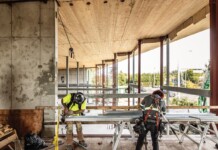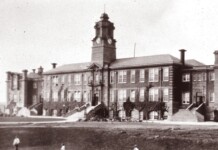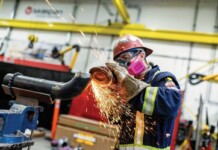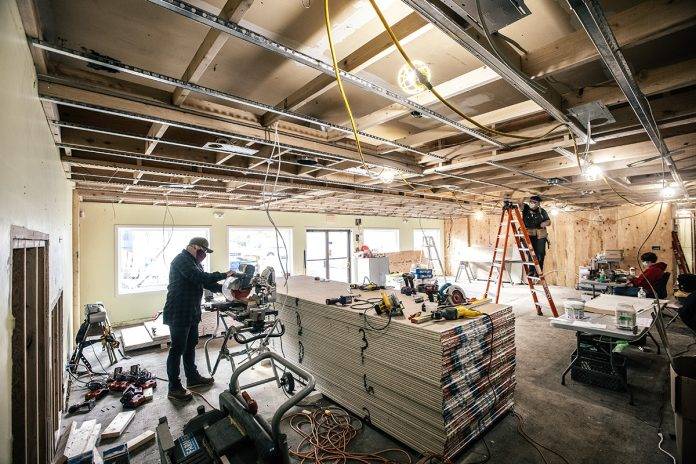
In 2018, electrician Cory McGregor volunteered on a HeroWork Radical Renovation project for the Mustard Seed Dignity Market. One lunch break, he polled his colleagues to see why they had chosen to work on the project.
“Why are you interested in coming out on a Saturday at eight in the morning to volunteer?” recalls McGregor, a member of the International Brotherhood of Electrical Workers (IBEW Local 230). “And one of our members said, ‘You know, growing up, my parents relied on the food bank.’ ”
It surprised McGregor.
But then again, it didn’t.
The gaps are everywhere. They’ve been there for a long time — and they’re widening.
COVID has given us a sobering glimpse of the social fabric, and the memo has dropped: there is much to be done, and we need to do it together.
Business is in the middle of everything in a local economy. It is both giver and receiver. It is the engine for recovery. It is the strongest vector for driving social change. And, for most local businesses, it is reliant on a strong base of community support, without which it withers.
The critical issues that impact our community’s most vulnerable members also directly impact and influence a company’s staff, clients and business opportunities. Giving back with a donation of time, resources and skills strengthens the ties of our social contract and provides a significant return on investment: well-resourced humans create stronger economies and communities.
Business is the Fastest Vector for Driving Change
Money is energy, and it is one of the fastest-moving kinds. Business has the capacity to harness and direct that energy toward impactful ends.
In business, money aggregates quickly, projects get off the ground faster, change is handled more nimbly and a focus on efficiency maximizes the value of the contribution.
NGOs are at the forefront of human fragility and unserved needs. By lending their time, resources and skills, businesses can scale charities’ efforts multiplicatively, if not exponentially. As a local example, HeroWork brings businesses together to donate their time, capital and resources to renovate front line charitable organizations that stitch the social net together.
“When we look at community development, it’s not the government doing that,” says Trevor Botkin, executive director for the Victoria division of HeroWork Canada. “Charities are taking care of people right now. And any time [businesses] can involve themselves directly in making those wheels turn, you’re directly impacting people that are suffering the most.”
Many hands make light work. Programs like HeroWork’s Radical Renovations allow businesses to give in a targeted, efficient way that has a huge scale of impact.
The Mustard Seed, Peers Victoria, Anawim Companions Society, Our Place’s Therapeutic Recovery Community, and the Indigenous Perspectives Society are just a few recent Radical Renovations. To make the cut as a Radical Renovation candidate, HeroWork studies local charities to ensure that a given project will serve the community for years.
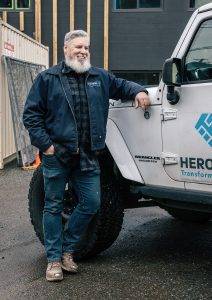
— Trevor Botkin, executive director for the Victoria division of HeroWork Canada. Photo By: Jeffrey Bosdet.
“Can we set this charity up for success?” Botkin asks. “When we talk about overdoses, when we talk about food insecurity, these are growing needs in our city. We can’t throw enough resources at them. So what we can do is take these charities that are doing it well and say ‘How do we build capacity for you?’ ”
Many businesses know they want to contribute to their community. What HeroWork provides is a way to give back that is driven by the charity’s needs, creates high impact results and is painstakingly organized. Hooking up with local businesses helps not-for-profit organizations eliminate up to 70 per cent of infrastructure renewal costs.
“We know that some percentage of our work is going to be pro bono, and we really look to see what opportunities there are out there for us to contribute,” says Justin Gammon, architect with Christine Lintott Architects, which commits about $25,000 toward charitable projects annually.
“HeroWork has made it really easy for us. They give us lots of time to prepare, and the scope of work is really well-defined. It makes it easy for us as business people to make a rationalized decision about…what are the resources that we’ve got looking ahead? Do we have that capacity? And can we carry this off in a meaningful way that’s going to achieve the goals for the organization involved?”
Joint Projects Facilitate Connections
In an interesting alchemical process, HeroWork’s cross-sector collaborations function as a collection point for people who share similar values.
“There are a lot of firms out there, and we work with a broad range of them,” says Gammon. “But there seems to be a cast of characters that we gravitate toward. These are people that become friends.”
Working together to renovate a building opens an additional avenue for professionals to connect. For leaders in the not-for-profit sector, those networks are hard to come by, simply on the basis of how much time employees spend “in the weeds” of their mission.
“We’re very skin and bones,” says director Terry Edison-Brown of his operating budget at Anawim House. “My actual work is probably 95 per cent with our people and 5 per cent executive director duties. I don’t have much time to actually get out and introduce myself and meet people.”
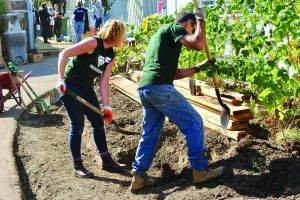
Photo Supplied.
As networks on all sides expand, so do local business referrals — a reminder that a rising tide lifts all boats. As people receive, so they give: Edison-Brown has volunteered on other HeroWork builds, which in turn has expanded his NGO-to-NGO referral network, helping to break down silos between organizations.
“I get to know those organizations better,” says Edison-Brown. “Because we go and talk, and I am able to find out more about that organization than I [knew] before.”
It’s a fulfilling arrangement on either side.
“It takes a village,” says Edison-Brown, whose organization benefited from a HeroWork Radical Renovation that brought new offices, repaired a flooding balcony, expanded workshop space, and added a fence and even some landscaping.
The renovation gifted Anawim House with structural improvements that the organization itself would never have used precious internal resources to achieve.
“Outside, our landscape was absolutely atrocious,” says Edison-Brown. “But we as an organization would never put money into beautifying our home because we have to feed, we have to provide. Steak on the table versus a flower outside? I’m sorry. The steak wins. And HeroWork, because of who they are, they see this.
Our concept at Anawim is to bring people into a loving home, get to know who they are and then we can help them help themselves. But if [our house is] a piece of shit, they’re going to feel like shit.”
HeroWork helped Anawim match the quality of its exterior to the important work being done inside.
Putting Purpose Alongside Profit
Not-for-profit organizations and businesses alike are efficient and effective, and collaborative projects where there’s a clear and doable goal are incredibly rewarding — for the project team and for each individual who throws in their hat.
In its current pilot, BBB4Good, the Better Business Bureau is identifying and issuing “trust marks” to businesses that have a purpose alongside their profit motive — a drive to give back in some way.
“Businesses are wonderful,” says Vancouver Island Better Business Bureau CEO and president Rosalind Scott. “They love to help.”
One such business is The Parkside Hotel and Spa, which positions sustainability and social responsibility at the core of its operations. The hotel, originally built to meet LEED certification, was always “supposed to have a more meaningful purpose. Very forward thinking,” says Trina White, general manager of the Parkside.
Much of this evolution has relied on partnerships with local charities and not-for-profits. The hotel is entirely carbon neutral through offsets such as contributions to the Great Bear Rainforest and the Quadra Island reforestation project.
All of their recyclables, totalling upwards of $500 per month, are donated to the Surfrider Foundation. And, with the help of Bees Please Farms, the hotel’s rooftop houses a pair of beehives to help contribute to the neighbourhood’s pollination resources. The Parkside pollinators roam from Beacon Hill to St. Ann’s Academy and the streets surrounding the hotel, helping keep local plants healthy.
While Parkside continuously tries to reduce consumption and purchase only what they need, renovations and updates are routinely required for the hotel. When this happens, they work with various local organizations to ensure their used products find second homes.
“It’s all about making sure that everything avoids the landfill and can be reused in a meaningful way,” says White.

Furniture has helped spruce up low-budget senior centres and linens have been donated to be emergency supplies in communities dealing with fires or floods and have also been used to make first aid supplies.
White feels this connection to local not-for-profits and a deep commitment to their values is an integral part of doing business these days.
“The best advice I can give, is look at your 17 Sustainable Development Goals by the United Nations. Then see how you can make that more meaningful.”
— Trina White, General Manager, The Parkside Hotel and Spa
“Businesses can no longer operate with that traditional kind of one way compensation,” she says. “I think that businesses that don’t shift are going to find themselves sunsetting in the next decade. They just won’t be aligned with the consumer.”
Not only does giving back help focus a company’s values and make employees feel good, but it also drives profit.
“Consumers want to actually use those companies, buy from those companies,” says Better Business Bureau CEO Rosalind Scott. “If you’re going to hire somebody to build your house, you want to know that that company is sustainable, and they’ve got good practices all the way around.”
Strong Local Economies Offer the Richest Soil
The pandemic is a sharp reminder that nothing is guaranteed. That we’re more reliant on one another than we tend to imagine. And that the effects of financial strain, whether hidden or exposed, are at work around us all the time.
Partnering with local charities to donate time, money and expertise maximizes your business’s ability to drive change. It expands your network, fosters stronger ties between community members and breathes strength into the third-sector service providers that heal and give shape to your community.
“You never know who’s needing those services,” says Cory McGregor, thinking back to his lunchtime conversation at the Mustard Seed Dignity Market. “The people who you work with in your offices may be relying on some of those services. They may know someone relying on those services, or they may have grown up using those services.” ′



